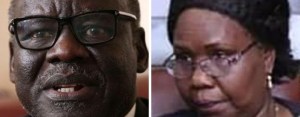The South Sudan Opposition Alliance (SSOA) is divided over the deal reached by President Salva Kiir and Five Vice President Riek Machar on the selection of governors for the country's 10 states on June 17.
The parties to the peace agreement had been locked in a four month-long impasse over the allocation of states.
According to the deal reached by Kiir and Machar, President Kiir’s side will nominate governors for six states, namely: Lakes, Northern Bahr el Ghazal, Eastern Equatoria, Central Equatoria, Warrap and Unity.
Dr Riek Machar’s Sudan People’s Liberation Movement-In-Opposition (SPLM-IO) got Western Equatoria, Western Bahr el Ghazal and Upper Nile states, while the South Sudan Opposition Alliance (SSOA) will nominate the governor for Jonglei state.
Speaking to Radio Tamazuj on Thursday, Josephine Joseph Lagu, the chairperson of SSOA said they reject the deal reached by Kiir and Machar on the allocation of states.
She said the meeting between Kiir and Machar took place in the absence of SSOA’s representative at the presidency, Hussein Abdelbagi.
"The Alliance is not bound by outcomes of a meeting in which we are not a party, because our representative is still in Aweil for his father's burial. We are waiting for further clarifications,” Lagu explained.
The SSOA chairperson, however, said the coalition adheres to outcomes of a meeting they held with the president on May 7 in which Upper Nile State was allocated to SSOA.
But the secretary general of the Alliance Dr. Lam Akol and the group’s security affairs secretary Lt. Gen. Bapiny Monytuil on Friday welcomed the agreement on the selection of governors.
The two politicians appreciated the efforts of the two principles to break the deadlock over the issue of states.
“We stand with the said decision and urge that the Governors be appointed as soon as possible for them to go on with the implementation of the peace agreement together with the national government,” the statement reads in part.
Atem Simon, a political analyst, said the ongoing division over the sharing of state leadership positions could raise political tensions.
He said most of the leaders of the political and armed movements who signed the peace agreement have proved that they are only seeking power rather than implementing the peace agreement.
Atem urged the peace monitoring body (R-JMEC) to convene a meeting of the parties to the peace agreement to avoid a new crisis in the implementation of the peace agreement.




